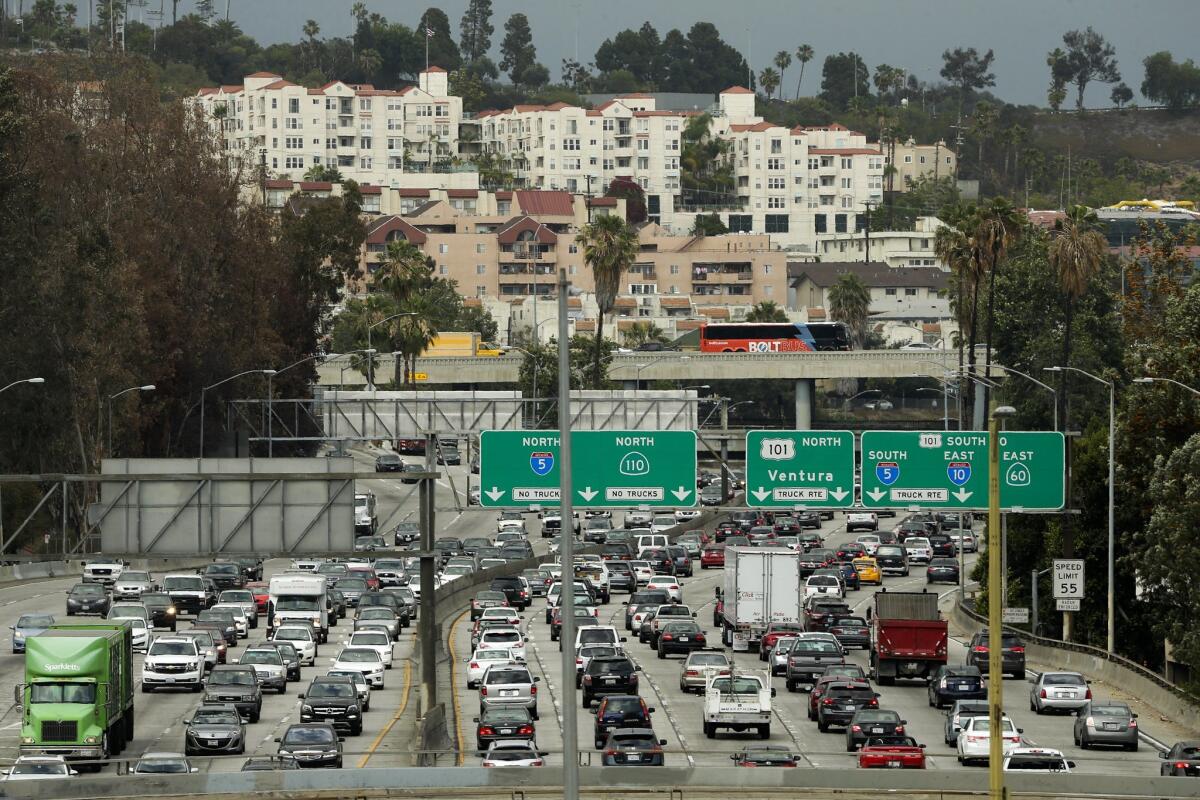Readers React: Fuel economy standards are one weapon in the fight against global warming

Traffic slowly moves along the 110 Freeway during afternoon rush hour in downtown Los Angeles.
- Share via
To the editor: Salim Furth asserts that the intended goal of automotive fuel economy standards is to curb global warming, and because this is not happening, the standards should be abandoned. (“Want to fight global warming? Forget fuel economy standards and focus on land use,” Opinion, April 4)
I don’t recall anyone saying that automotive fuel efficiency by itself would stop climate change, and using a skewed discussion of corporate fleets to represent all automobiles is bad form. It seems self-evident that global warming will be reduced by a wide variety of measures, of which automotive fuel efficiency is just one.
The author further reduces his credibility by asserting that reduced land sprawl and increased density (through reduced regulation, of course) will reduce climate change. But unless cities shrink, the only way density will increase is with higher population. Is 7 billion people not enough?
Ed Salisbury, Ontario
..
To the editor: Furth proposes that fuel economy costs more to drivers than the gas they save and makes no difference on climate change.
It may be true as he narrows his study to a couple of variables. But if one looks at the bigger picture, the story is quite different. Oil has to be extracted, refined and transported. Wars are fought to keep control over that key resource. Fracking uses a lot of water and has severe consequences.
All of these “externalities” are costly and have serious effects on the climate.
Marie Matthews, San Pedro
..
To the editor: This piece is a veiled attempt to delegitimize federal oversight of automobile fuel economy.
First, there is no question that standards for auto manufacturing have had a huge effect on our air quality, safety and fuel efficiency. Second, the writer points out that cars get more expensive over the years, but he fails to make a real connection between price and efficiency. For one thing, vehicle amenities and power climb as automakers answer demand to make subsequent models better, leading to higher prices.
Third, fuel economy laws are clear, achievable and effective; replacing them with nonspecific and non-mandatory urban planning guidelines is a recipe for failure. Some communities may make improvements, some may do nothing or even make things worse. Urban planners may be subject to prevailing commercial interests.
Lastly, the writer states that we needn’t choose between the environment and prosperity. He is correct, but that doesn’t mean we have to choose between fuel economy standards and livable cities.
Cullen Davis, North Hollywood
Follow the Opinion section on Twitter @latimesopinion and Facebook
A cure for the common opinion
Get thought-provoking perspectives with our weekly newsletter.
You may occasionally receive promotional content from the Los Angeles Times.






